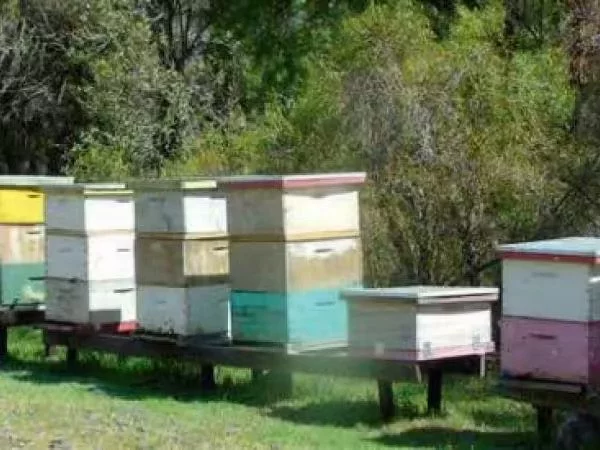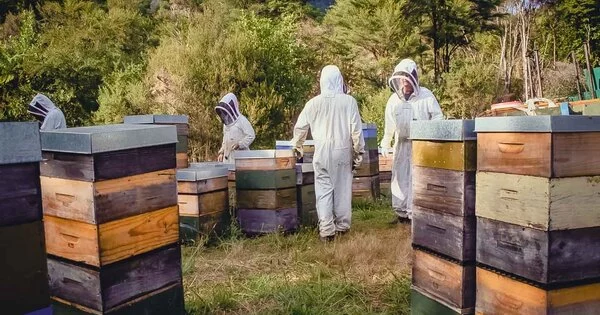Honey bee colonies managed using organic methods were as healthy and productive as those managed in conventional systems, while avoiding the use of synthetic pesticides to control pests and pathogens inside the hive, according to newly published research led by Penn State entomologists.
The researchers said they believe that their study, which compared the performance of honey bees under three types of management systems, is the first to show that organic beekeeping management is sustainable and supports high honey-bee survival and honey production.
The methods beekeepers use to manage honey bee colonies are crucial in helping their bees overcome stressors such as pests, diseases, pesticide exposure and nutritional deficiencies, noted study lead author Robyn Underwood, apiculture educator for Penn State Extension.
“Beekeeping management is a key aspect of honey bee health because it can help mitigate some of the negative effects caused by these stressors,” Underwood said. “For example, supplemental feeding can mitigate a lack of flowering plants nearby for foraging, and beekeepers can manage pests such as Varroa mites with cultural, mechanical and chemical control practices.”
We wanted to replicate what beekeepers were doing in their bee yards. It wasn’t scientists just telling beekeepers how to do things – it was beekeepers telling us how they do things, and then we collected data over multiple years comparing the different systems.
López-Uribe
Despite these management tactics, 30% or more of honey bee colonies in the United States — including about 40% in Pennsylvania – die each winter, and beekeepers around the world continue to seek advice on best management practices to maintain healthy and productive bees.
Study co-author Margarita López-Uribe, associate professor of entomology and Lorenzo L. Langstroth Early Career Professor in Penn State’s College of Agricultural Sciences, pointed out that there has been little research conducted on organic beekeeping, primarily because of requirements that limit beekeepers’ ability to sell their products as certified organic.
“In addition, existing studies largely have looked at the effect of one or two aspects of management at a time,” she explained. “But in reality, risks and benefits occur in the context of numerous other management decisions involved in beekeeping. Studies like ours using a systems approach can help us better understand the long-term trade-offs among the various practices.”
To evaluate the effectiveness of various beekeeping approaches, the researchers studied nearly 300 honey bee colonies located on eight certified organic farms — six in Pennsylvania and two in West Virginia. The research team developed study protocols in collaboration with 30 experienced beekeepers.
“We wanted to replicate what beekeepers were doing in their bee yards,” López-Uribe said. “It wasn’t scientists just telling beekeepers how to do things – it was beekeepers telling us how they do things, and then we collected data over multiple years comparing the different systems.”

Colonies in the longitudinal study were grouped under one of three broad beekeeping management systems based on different beekeeping philosophies:
- Conventional management, which is based on frequent intervention and application of any available chemical and nutritional supplement to keep colonies alive. This management system often is used by large-scale commercial beekeepers and incorporates the use of synthetic chemicals and antibiotics for pest and disease control.
- Organic management. This management system is based on intervention only as needed and excludes the application of synthetic chemicals or antibiotics. This system is common among small and medium-scale beekeepers and incorporates an integrated pest-management approach that combines cultural practices with organic-approved chemical treatments for pest control.
- Chemical-free management. Popular among hobbyists, this is characterized by the absence of chemical applications and the minimal frequency of interventions to the colony. This system relies strictly on cultural practices for pest control and the bees’ own defenses against pathogens.
The researchers monitored the colonies over a three-year period, recording overwintering survival and measuring honey production, parasite and pathogen abundance, and the expression of genes regulating immune function as a biomarker of honey bee health.
Their results, reported recently in Scientific Reports, showed that organic and conventional management systems both increased winter survival by more than 180% compared to chemical-free management. Organic and conventional management also increased total honey production across three years by 118% and 102%, respectively. Organic and conventional management systems did not differ significantly in survival or honey production.
Similarly, when compared to the chemical-free systems, organic and conventional management both reduced levels of parasites and pathogens. This included the Varroa mite, which is a serious vector of viral diseases of bees; Vairimorpha ceranae, the microsporidian parasite that causes Nosema disease; and deformed wing virus. Immune gene expression also was lower in the organic and conventional systems relative to chemical-free management.
Because decisions in beekeeping are rarely made in isolation, the researchers said their holistic systems approach is well-suited for incorporating the results into beekeeping operations. They noted that recommendations based on the organic systems used in the study are included in Penn State Extension educational programs and materials for organic beekeeping management.
















